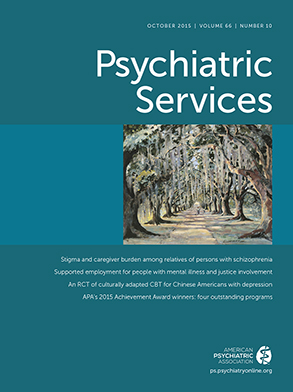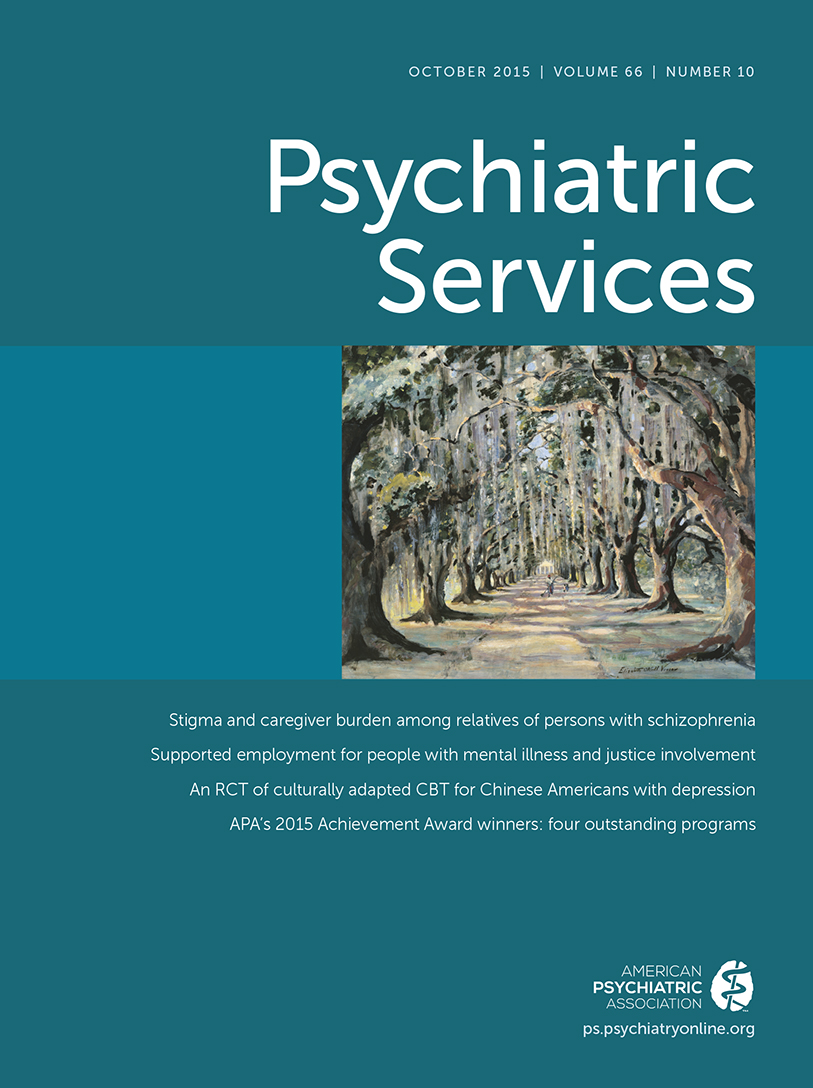There is a growing evidence base for the cost-benefit of scaling up services in low-income settings (
1,
2), but research has tended to focus on common mental disorders. To achieve universal health coverage and equity, the most vulnerable individuals also need to be considered, even if they require more resource-intensive services.
In Africa, as elsewhere, severe mental illness is associated with human rights abuses. Chaining, beating, forced treatment, imprisonment, and sexual abuse are well documented, including in settings where people should be receiving care (
3). Services for people with severe mental illnesses, such as schizophrenia, are scarce in low-income countries, although such services are an essential component of an optimal service mix (
4). In Nigeria, 85% of persons who need treatment do not receive it (
5). This absence of appropriate care contributes to increased rates of homelessness (
6) and imprisonment (
7). In this column, we use a case study methodology (
8) to review two programs in West Africa that provide services for homeless persons with mental illness living in extreme poverty.
Context and Local Health Systems
The two services discussed in this column—Amaudo Itumbauzo in Nigeria and Association St. Camille de Lellis in Côte d’Ivoire and Bénin—are located in rural settings outside large towns. Most people served by these programs are from the poorest communities, where subsistence farming is the mainstay of the economy. In all three countries, almost all government mental health spending is on tertiary hospitals. This inefficient use of resources is typical in Africa, where on average less than 1% of national health budgets are allocated to mental health, and 31 countries have no dedicated mental health budget (
9).
Mental health services are rarely available in primary care settings. Most people who need these services bypass primary care and use specialist hospitals in large cities, where almost all mental health professionals are based. Most people first seek help from traditional religious healers in the informal sector, and they often have no alternative. Payment for services is out of pocket, and hospital admissions are prohibitively expensive. For example, in Côte d’Ivoire, the daily admission cost is US$16.20 per day, and the average daily income is only US$3.20. A large initial deposit is generally required, and a family member usually accompanies the patient on the long journey to a hospital (an opportunity cost). This hinders follow-up, and regular relapse has been noted as a result.
From Center to System
Association St. Camille was founded in 1983 in Bouaké, Côte d’Ivoire, by Grégoire Ahongbonon, a Béninois mechanic, and his wife. Initially they worked with homeless people and people with HIV/AIDS on the streets and in prison, later focusing on those with mental illness. They established their first center in a hospital café in 1992. Since then they have expanded within Côte d’Ivoire, and in 2004 they also started work in Bénin, a shift prompted by the war in Côte d’Ivoire and a desire to replicate the successful work (
10).
Amaudo Itumbauzo was founded Umuahia in the Nigerian State of Abia in 1989 by Rosalind Colwill, a British social worker. Her initial work in Nigeria was in leprosy care, but she became convinced that mental illness was the “new leprosy.” With the support of the Methodist Church of Nigeria, she established the first center in 1990 in a forest clearing donated by the local villages in Itumbauzo, Abia State.
Association St. Camille and Amaudo Itumbauzo have evolved beyond center-based care for homeless persons and provide outreach services, including support for discharged residents. Amaudo engaged with government to provide mental health care in primary care settings across four states in southeast Nigeria under the Community Mental Health Program (CMHP). St. Camille has a system of “relay centers,” which make use of the wide network of dispensaries run by Catholic Sisters in Bénin and Côte d’Ivoire. These provide a local supply of medication and basic care and advice. Both programs have teams to find people lost to follow-up, receiving reports from psychiatric nurses in the CMHP (Amaudo) or relay centers (St. Camille). Despite these efforts, the programs often lose contact with former residents.
St. Camille now has a total of four residential centers, six rehabilitation centers, and a general hospital in Côte d’Ivoire. In Côte d’Ivoire, the work continued during the war, but one rehabilitation facility was destroyed. There are now four residential centers and three rehabilitation centers in Bénin. St. Camille’s rapid expansion was criticized for affecting available resources and the quality of work in existing facilities. Since 1993, St. Camille’s various centers have recorded 52,021 client contacts.
After Amaudo established a residential center in 1992, a second center (Amaudo 2) was established five years later to provide a community for patients who could not be discharged to their families. Amaudo 2 now has 12 permanent residents—surprisingly few given the stigmatizing nature of mental health conditions. In addition, a community-based rehabilitation program focusing on disabled children, Project Comfort, was established in 2002. Since 1992, the main Amaudo center has discharged 452 people who have undergone rehabilitation. Staff continue to monitor and follow these former residents. In addition, around 1,000 patients are seen per month in Amaudo’s CMHP services in southeast Nigeria.
Conceptual Models
Both programs have reported that human rights abuses are common, and cite this as the major motivation for their establishment. Both programs identify and serve homeless people, mainly those with schizophrenia, who are admitted for general medical and mental health care in a process leading to skills development, discharge, and social reintegration. The most important component of care is residents’ participation in joint community life, which allows them to build social skills after many years of homelessness. When Amaudo was founded, the aim was to heal using only this environment, but it was soon recognized that medical (psychiatric) treatment was also essential.
The Amaudo center has been described by interviewees in the case study as providing a “loving environment, where people are treated with dignity and respect” and a place where they “carry out everything together—eating, sports, community work and worship.” The physical beauty of the environment is also emphasized. Similarly, St. Camille’s ethos was described in interviews as the provision of “hospitality, shelter and food, unconditional acceptance and love, active listening by peers and personnel.”
Although the two programs are similar in approach, there is no evidence of cross-fertilization of ideas. They share a common Christian world view. Amaudo means “village of peace” in the local Igbo language. The St. Camille residential centers are called Centres d’Accueil, French for “welcoming centers,” and “Oases d’Amour.”
Treatment, Rehabilitation, and Reintegration
In addition to the therapeutic environment, general medical and psychiatric treatment and associated services are provided by both programs. Older-generation medications are the mainstay of treatment, but securing reliable supplies is a problem. Because of the high rates of counterfeit drugs, both programs import generic drugs, resorting to local pharmacies when necessary. Although both aim to offer a holistic approach, psychological interventions by suitably qualified personnel are limited. In Amaudo, regular counseling is offered by the chaplain (with little formal training), and in St. Camille the head nurse provides patient and family education about mental illness.
In both programs, admissions range from a few weeks to over a year; a stay of six to nine months is average. This reflects the prolonged duration of untreated psychosis (often from five to 20 years) before admission, the time taken for rehabilitation, and occasional delays in repatriation because of family reluctance to participate. The programs both try to identify families and reunite them, teaching them how to care for their relative. Discharged clients are also equipped with tools to build livelihoods in the community, maximizing social integration and reducing caregiver burden. Amaudo offers training in the center workshop (tailoring, hairdressing, farming, and woodwork), with local village artisans providing the expertise.
St. Camille has a different system, in which recovered clients attend external rehabilitation centers—social enterprises where people participate in income-generating activities such as rabbit rearing; farming; soap making; baking; cloth weaving and sewing; hairdressing; crafts, such as batik; and juice making. Some are employed in this role, and others are in a form of apprenticeship.
Human Resources
The two programs are mainly staffed by nonspecialists who are recruited locally, which is important for the programs’ relationship with local communities. Staff are paid very low salaries in both programs, which cannot afford to compete with the state and private sector in salaries for professional staff. Thus the programs also rely on volunteers. Amaudo has several professional staff employed by the church or the state and posted at the center and makes use of government nurses in the CMHP. St. Camille employs some former clients, funding their nursing training. To avoid dependence, Amaudo has a firm rule against employment of former residents.
Both programs use international volunteers to provide training in professional and technical skills. Regular visitors come to St. Camille from France, Spain, and Canada. Amaudo formerly made extensive use of volunteers from the United Kingdom but no longer does so, which is a result of deliberate succession planning and of insecurity in the region. Weaknesses in information management and reporting were described in both programs, such that it is difficult to easily measure outcomes at individual and organizational levels.
Both programs have a centralized management system, because attempts to devolve power have not succeeded because of a combination of capacity and trust issues. The St. Camille founder has been president since the program’s inception and is regularly reelected. The board includes members of the Catholic Church and several former service users. The founder of Amaudo now sits on the board as a member.
Financial Resources
St. Camille has relied on donated land for established facilities, mainly from the Catholic Church, and several international donors support the program’s work. The founder is known for his capacity to negotiate reduced bills or receive free services. St. Camille also receives some income from rehabilitation centers, for example, bakery and weaving centers in Bénin.
The land on which Amaudo was built was donated by the local community, and the program benefits from support from local churches. This link with the wider church has provided both programs with a reliable source of support, financially and politically. Like St. Camille, Amaudo receives funds and gifts in kind from local churches and individuals (mainly food), particularly on special occasions such as Christmas. Amaudo receives a small amount of funding from the state, but this is unreliable and requires significant investment in time and energy. “Amaudo UK” (
www.amaudo.org/) provides a base for awareness raising, capacity building, and fund raising in the United Kingdom. Amaudo also receives some income from international individual and organizational donors.
Notably, the founders of both programs rely on personal reputation and charisma to raise funds. Although this has produced remarkable growth, it is not a strong basis for sustainable long-term income. [A table listing the common strengths and weaknesses of the two programs is available in an online supplement to this column.]
Conclusions
These two programs show clearly that services work best when rooted in established local structures and can provide comprehensive solutions to address social inclusion of a very marginalized group. Extreme poverty, severe mental illness, homelessness, human rights abuses, poor infrastructure, and postwar contexts make provision of services difficult, but these programs demonstrate that it is possible to provide and sustain care for people with complex needs even in the most challenging environments.
Acknowledgments
The authors thank Rosalind Nkechi Colwill, founder of Amaudo Itumbauzo; Grégoire Ahongbonon, founder of St. Camille de Lellis; and the many dedicated staff, volunteers, and residents of both organizations.

